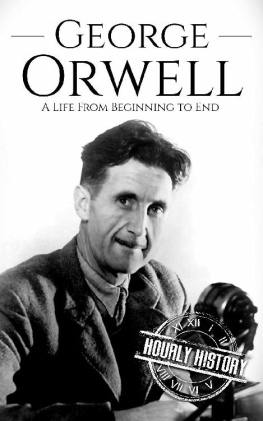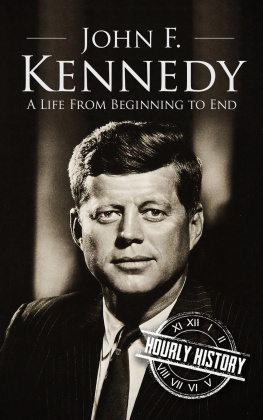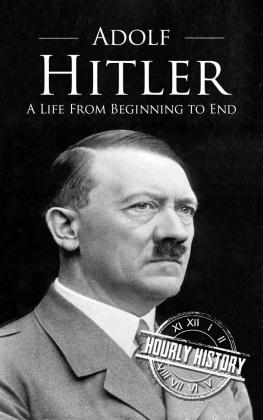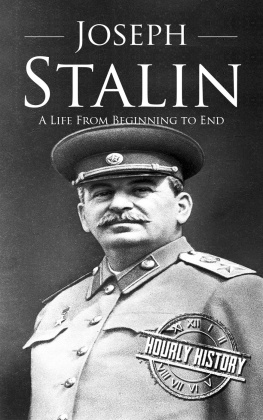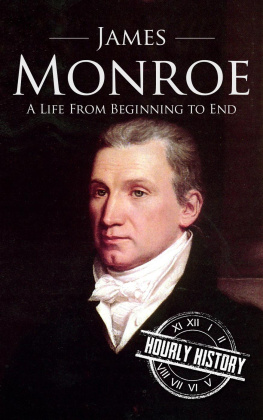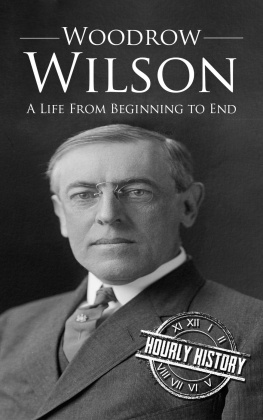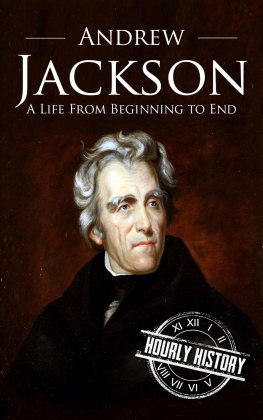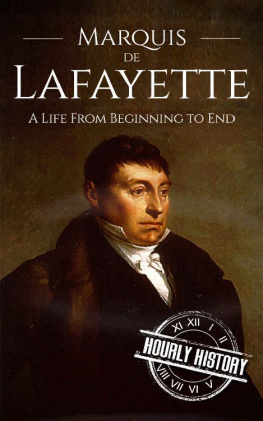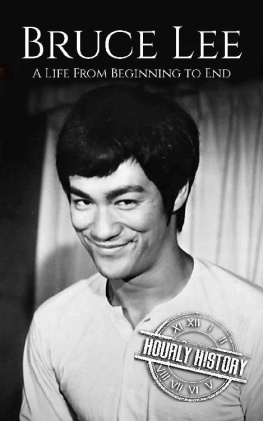Hourly History - George Orwell: A Life from Beginning to End
Here you can read online Hourly History - George Orwell: A Life from Beginning to End full text of the book (entire story) in english for free. Download pdf and epub, get meaning, cover and reviews about this ebook. year: 2019, publisher: Independently published, genre: Non-fiction / History. Description of the work, (preface) as well as reviews are available. Best literature library LitArk.com created for fans of good reading and offers a wide selection of genres:
Romance novel
Science fiction
Adventure
Detective
Science
History
Home and family
Prose
Art
Politics
Computer
Non-fiction
Religion
Business
Children
Humor
Choose a favorite category and find really read worthwhile books. Enjoy immersion in the world of imagination, feel the emotions of the characters or learn something new for yourself, make an fascinating discovery.
- Book:George Orwell: A Life from Beginning to End
- Author:
- Publisher:Independently published
- Genre:
- Year:2019
- Rating:5 / 5
- Favourites:Add to favourites
- Your mark:
- 100
- 1
- 2
- 3
- 4
- 5
George Orwell: A Life from Beginning to End: summary, description and annotation
We offer to read an annotation, description, summary or preface (depends on what the author of the book "George Orwell: A Life from Beginning to End" wrote himself). If you haven't found the necessary information about the book — write in the comments, we will try to find it.
George Orwell: A Life from Beginning to End — read online for free the complete book (whole text) full work
Below is the text of the book, divided by pages. System saving the place of the last page read, allows you to conveniently read the book "George Orwell: A Life from Beginning to End" online for free, without having to search again every time where you left off. Put a bookmark, and you can go to the page where you finished reading at any time.
Font size:
Interval:
Bookmark:
Copyright 2019 by Hourly History.
All rights reserved.
George Orwell was the son of a British civil servant working in India. He was born under the name Eric Arthur Blair, but the pen name he adopted and used throughout his life was George Orwell, and that is how this book will refer to him.
The Blair family had some aristocratic ancestry, however by the time Orwell was born, they had lost their wealth and were considered middle-class. Orwell began to identify with the underdogs of life at an early age, but nothing in his background could have predicted the effect his novels would have on society.
All of Orwells writing reflects a strong sympathy for the lower classes and an antipathy toward the ruling elite. Although Orwells two most famous novels, Animal Farm and 1984, are very different, they both depict the horrors of totalitarian power and the need for the population to become educated enough to resist. Early on, Orwell became a socialist and a champion for liberty and free thought. Most of all, he was an advocate for equal, fair treatment of all people. Unfortunately, he never quite figured out how to make such a utopia happen.
Born on June 25, 1903 in Motihari, George Orwell was the son of a minor British civil servant, Richard Blair, working in India inspecting opium fields. His mother, Ida Mabel Limouzin, was the daughter of a Burmese merchant born into minor nobility. Mr. Blair could trace his ancestry back to aristocracy and wealth; however, by the time Orwell was born, his family had lost its considerable fortune and prestige and was considered merely middle-class. Orwell was always conscious of the fact that although his family wasnt rich, it was a part of the ruling class.
Like most children of British colonial administrators, Orwell received his education in boarding schools in England. In 1904, his mother moved him and his older sister to England and settled in the village of Henley-on-Thames. From that time on, Orwell rarely saw his father until 1912, when Thomas Blair retired. Orwell attended the local convent school and enjoyed a relatively carefree existence. He did well in his studies and enjoyed fishing and being outdoors. He made friends with the local bricklayers, workers, and their children. In socially conscious Edwardian times, however, such mingling between the classes was frowned upon, and his mother soon forbade him to associate with the lower classes.
In 1911, Orwell was accepted into the prestigious St. Cyprians preparatory school as a scholarship student. Here, again, he would learn first-hand about the rigid rules of class distinction. Since his father only received an annual retirement pension of 438 pounds, Orwell was introduced to fellow students considerably wealthier than him. Later in life, he indicated how he hated the prevailing snobbish attitude at St. Cyprians and its class system. His headmaster never failed to remind him of his reduced circumstances. Other, richer, students were shown favoritism, something that Orwell would resent for the rest of his life. At St. Cyprians, he felt excluded from those privileged through a mere accident of birth. The headmasters wife even denied Orwell a birthday cake, something other students received, because, as she pointed out, a charity student didnt deserve such largesse. For the remainder of his life, Orwell was unable to conform to a society that made him feel like an outsider. All of his writing was a cry against and denouncement of class distinction and privilege.
Still, Orwell worked hard enough to have two poems published in the local newspaper while he attended St. Cyprians. He also received a scholarship to Englands most prestigious public school, Eton College, one of only 16 annual scholarships offered by Eton. When Orwell set foot in Eton College at the age of 14, he entered one of the most elite educational institutions in England. It was the apex of social and intellectual existence, attended by children of royalty and the wealthy who could afford the cost of a privileged education. Luckily, the atmosphere was far less bullying than the one Orwell had experienced at St. Cyprians. The faculty was tolerant and trained to deal with each student as an individual.
At Eton, Orwell did not distinguish himself academically, but he loved a good debate. Although a mediocre student, he was extremely well-read, having completed the works of John Galsworthy, H. G. Wells, Samuel Butler, and George Bernard Shaw. Orwell is also remembered for being somewhat mean-spirited. After parents visiting days, he invariably ridiculed his own parents and those of his fellow classmates. One fellow Etonian recalled, I dont think he was very kind. Another described him as passive and aloof.
What Orwell did enjoy was physical activities, from swimming to shooting to fishing. His vacations were frequently spent with the Buddicom family, friends from Orwells days in Henley-on-Thames. He enjoyed the company of Prosper Buddicom, who was his own age, and Prospers sister, Jacintha Buddicom, who would become Orwells first serious love interest.
After leaving Eton College in 1921, Orwell briefly stayed with his family while he considered his future. Mr. Blair insisted that Orwell follow in his footsteps and work as a civil servant in one of the colonies. Not having a better alternative, Orwell planned on joining the Indian Civil Service, but his poor performance at Eton did not even qualify him for the entrance examination. Fortunately, the Indian Imperial Police had less stringent requirements. From Orwells point of view, this was better than working as a clerk in some office. Since his mother had been raised in Burma, a province of India at the time, that country became his first choice. He had grown up hearing his mothers tales of this exotic location and was eager to see it.
Orwell passed his Indian Police Examination and sailed for Burma in October of 1922, at the age of 19. In Burma, he underwent a nine-month training period at the Burma Provincial Police Training School in Mandalay. His duties included both clerical tasks and inspections of nearby villages. The feelings between Burmese citizens and the British colonialists were tense. The Burmese didnt want the British there, and Orwell felt a great deal of opposition from the locals. He often wrote to Jacintha, but she soon stopped corresponding. The budding romance was not to be.
Orwell didnt spend a great deal of time associating with his fellow civil servants. While they enjoyed a fun evening of carousing in the local bars, he spent time by himself reading. The longer he was there, the more he began to resent British imperialism, something he would describe at great length in his future essays and novels. In his essay Shooting an Elephant, Orwell wrote, I perceived in this moment that when the white man turns tyrant, it is his own freedom that he destroys. His stay in Burma heightened his social and humanitarian awareness as well as his antipathy toward the British Empire. He also became fully aware of his unsuitability to be a policeman.
After five years in Burma, George Orwell was ready to return to England. His father was furious that he had resigned from the civil service, but Orwells experience as a policeman and his love of books had made him rethink his future. He had hated being a civil servant, and another assignment wasnt going to change that. Orwell was now 24 years old, and the idea of becoming a writer was tremendously appealing. After a stint in London, he decided to try his luck in the European capital famous for its love of arts; in early 1928, George Orwell set sail for Paris, France.
Font size:
Interval:
Bookmark:
Similar books «George Orwell: A Life from Beginning to End»
Look at similar books to George Orwell: A Life from Beginning to End. We have selected literature similar in name and meaning in the hope of providing readers with more options to find new, interesting, not yet read works.
Discussion, reviews of the book George Orwell: A Life from Beginning to End and just readers' own opinions. Leave your comments, write what you think about the work, its meaning or the main characters. Specify what exactly you liked and what you didn't like, and why you think so.

